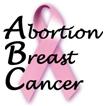Why Aren't Women Being Told
Displayed here are the inside and back contents of: Why Aren't Women Being Told?
Inside: Why Aren't Women Being Told?
Breast cancer is the leading cancer in women with an estimated 203,500 American women being diagnosed with invasive breast cancer and 39,600 women dying from breast disease in 2002, yet women are not being told of the connection between abortion and breast cancer.
Not all women who have breast cancer have had an abortion, but it has been determined to be the most preventable cause of breast cancer. Many of the risk factors can be controlled by the choices women make. Choosing between abortion or childbirth can influence breast cancer risk. An abortion during high levels of estrogen starting in early pregnancy can predispose a woman to getting breast cancer. Prolonged use of contraceptives/abortifacients, especially before a full term pregnancy, can also increase the risk.
Many physicians are not aware of the connection between abortion and breast cancer or do not acknowledge the preponderance of evidence. However, you are responsible for your own health care. It is important for you to fully disclose your own health history and to discuss the connection between abortion and breast cancer with your doctor.
"Since 1998, cases have been commenced which have also claimed the additional failure to warn of an increased risk of breast cancer caused by abortion. Recently one of those cases has been settled for an undisclosed amount. This is believed to be the first case of its kind in the world. Although the woman had not developed breast cancer, she nevertheless received a significant sum."
- Attorney Charles Francis, QC, Melbourne, Australia
The Estrogen Factor
Why induced abortions raise breast cancer risk
Most of the known risk factors for breast cancer involve some form of over-exposure to the female sex hormone, estrogen. Estrogen is known to be a growth promoter of both normal and abnormal breast tissue and is, therefore, known as a secondary carcinogen or a tumor promoter.
In a normal pregnancy, the mother’s ovaries begin producing extra estrogen within a few days after conception. The level of estrogen in her blood rises by 2000% by the end of the first trimester - to a level more than six times higher than it ever gets in the non-pregnant state.
During the first and second trimesters, her breasts enlarge because a hormone called estradiol, a type of estrogen, causes both normal and pre-cancerous breast cells to multiply.
In the third trimester, the differentiation process occurs. Differentiation shuts off the cell multiplication process and shapes breast cells into milk-producing tissue.
If the pregnancy is aborted, the woman is left with more undifferentiated - and therefore cancer vulnerable - cells than she had before she was pregnant. On the other hand, a full term pregnancy leaves her with more milk-producing differentiated cells, which means that the mother has fewer cancer-vulnerable cells in her breasts than she did before the pregnancy. That is why a full-term pregnancy lowers the risk of breast cancer later in life.
In contrast, most miscarriages do not raise breast cancer risk because these pregnancies generate insufficient quantities of estrogen. This occurs because miscarriages are precipitated by a decline in the production of progesterone from which estrogen is made.
visit
AbortionBreastCancer.com
for more information
- 13 out of 15 U.S. studies show more breast cancer among American women who chose abortion. 29 out of 38 studies worldwide indicate an increased risk of breast cancer associated with induced abortion.
- The only statistically significant study on American women which relied entirely on medical records of abortion (not interviews after the fact) reported a 90% increased risk of breast cancer among women who had chosen abortion. Howe et al. (1989) Int J Epidemiol 18:300-4
- Dr. Lynn Rosenberg, testifying on behalf of abortion providers represented by the Center for Reproductive Law and Policy, admits that a young woman who aborts her first pregnancy is more likely to get breast cancer later on, than a young woman who carries her first pregnancy to term. Rosenberg (1999) NW FL Women’s Health v. State of FL, FL circuit Ct, 2nd circ., videotape deposition of 11/18/99, pp. 77-8.
- A woman who is pregnant when diagnosed with breast cancer or who gets pregnant after breast cancer is much more likely to be cured if she carries the baby to term instead of choosing an abortion. Clarck & Chua (1989) Clin Oncol 1:11-18.
- Since the mid 1980’s, breast cancer rates increased more than 40%. The increase is limited to women young enough to have had legal abortions starting in 1973, and did not occur among older women. Howe et al. (June 6, 2001) Jnl Natl Cancer Inst. Vol. 93, No. 11.
"Approximately 1.5 million abortions are performed each year in the United States, making the prospect of increased breast cancer cases a health care time-bomb."
-U.S. Congressman Dave Weldon, M.D.
"Dear Colleague" letter 8/24/99
Back: Why Aren't Women Being Told?
Are You At Risk?
Never having given birth or not giving birth until after age 30?
A pregnancy, especially a first pregnancy, which resulted in abortion?
Use of the "Pill" before a first full-term pregnancy or for 4 or more years?
Family history of breast cancer in first degree relative (mother, daughter or sister)? Risk is greater if relatives had cancer in both breasts and if it occurred before menopause.
Personal history of breast cancer?
Personal history of ovarian or uterine cancer?
Age: The majority of all breast cancer cases are in women over 50.
Early onset of menstrual periods (before age 12) or late onset of menopause (after age 55)?
At least 5 years of post-menopausal estrogen therapy?
Chronic alcohol use?
Obesity?
"Abortion is not the most common cause of breast cancer, but because it is a matter of choice, it is an avoidable risk."
-Joel Brind, PhD.
Author of 1996 comprehensive review and meta-analysis in collaboration with colleagues at Penn State
Coalition on Abortion/Breast Cancer
an International Women’s Organization
This 1988 study shows the reluctance of researchers to publish data showing the abortion/breast cancer link. Abortion data (see two rightmost bars) were withheld for seven years. Note that spontaneous abortion has no significant effect on risks; whereas, induced abortion does significantly increase a woman’s breast cancer risk.
a. Thomas E. Rohan et al, "A Population-Based Case-Control Study of Diet and Breast Cancer in Australia," American Journal of Epidemiology (1988), Vol. 128, pp. 478-489.
b. Nadine Andrieu et al, "Familial Risk, Abortion and Their Interactive Effect on the Risk of Breast Cancer," a combined analysis of six case-control studies, British Journal of Cancer (1995), Vol. 72, pp. 744-751.
The Coalition on Abortion/Breast Cancer is a women’s organization founded by Karen Malec to protect the health and save the lives of women by educating and providing information on abortion as a risk factor for breast cancer.

